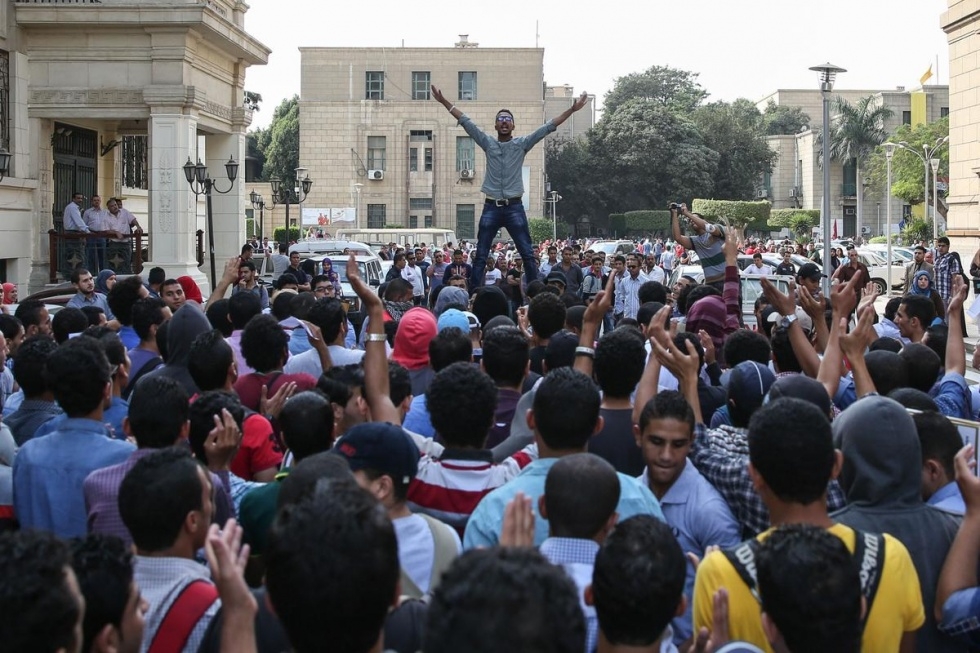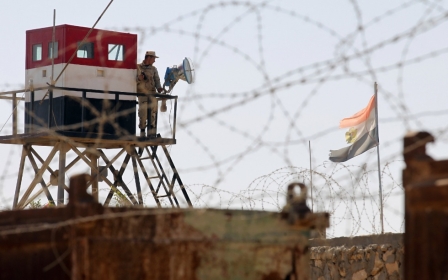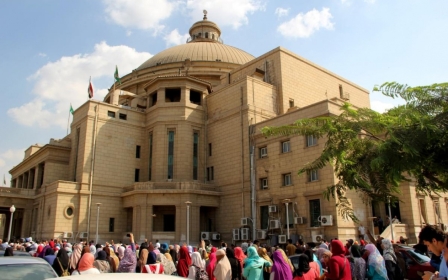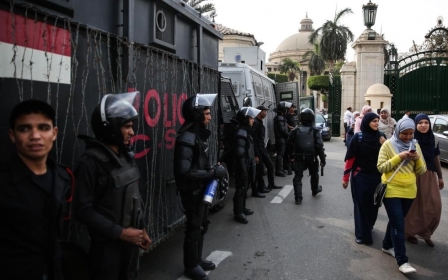Egypt bars students expelled over protests from private education

A national academic supervisory body has declared that hundreds of expelled students would not be allowed to enrol at other institutions, including privately-owned ones.
The move is seen by critics as a new measure to crackdown on Egyptian university students who are protesting against the military-backed government.
Students suspended from government universities will not be permitted to enrol in private universities, Cairo University President Gaber Nassar said on Monday after meeting with the High Council of Universities, Egyptian dailies reported.
Any private university that violates this stipulation will be dealt with accordingly, due to “the amount of violence and vandalism these students caused inside the universities they belong to,” Nasser said, according to Egyptian daily Mada Masr.
“Students who have been suspended received a letter from their university over the summer stating that their suspension includes all Egyptian universities and not just the institutions they were studying at,” said Hassan Farid, a student at Cairo University, who has been suspended since June.
“Tens of us tried to apply to other private and public universities but we haven’t been accepted at any,” Farid explained while saying that 94 students at Cairo University alone have been expelled.
Since 2013, hundreds of university students across Egypt have been suspended or permanently expelled for allegedly participating in on-campus protests and inciting violence. It is difficult to identify the exact number of suspended students with Egyptian authorities not releasing any official numbers and with statistics distributed across faculties. According to student activist however, the number is in the hundreds.
“Five-hundred and three students across the nation have been suspended, 250 of them just from al-Alazhar University,” said Youssef Salhen, spokesperson for Students against the Coup (SAC) and a student at al-Azhar.
SAC is a nationwide student-led movement with representatives across most public and private Egyptian universities. The movement - established after the ouster of President Mohamed Morsi by a military-backed coup in July 2013 - coordinates regular on-campus anti-government protests.
“Most of those suspended appealed the university decision through collective court cases. The courts issued decisions allowing 150 of them to resume their education, but they were rejected by university administration from returning again,” Salhen told MEE.
According to Mohamed Nagui, a researcher in the academic freedoms unit at the Association for Freedom of Thought and Expression (AFTE), the suspension of students has been used to stifle student political activism.
“It is part of the general atmosphere of limiting academic freedoms. The regime is working on punishing these students due to their political stances. The government is putting their future on the brink to send a terrifying message that showing any political dissent is going to be met with suspension,” Nagui told Mada Masr.
Students and faculty members have rendered the reasons given to justify the university decisions to suspend scores of high-achievers, arbitrary and unfair.
“Each student suspended or expelled was given the exact same list of grounds for the decision. They included alleged participation in illegal protests, incitement of violence and chaos and attempting to disrupt exams throughout the academic year,” Farid told MEE.
While most of the students suspended have been involved in on-campus demonstrations against the military government, not all of those whose education and future careers were abruptly terminated, had been politically active at all.
“A high honours student named Rasha majoring in politics - who was expecting to receive a teaching offer at the university after her graduation - was suspended for refusing to be searched at the gates,” said Farid.
“Some students were just suspended because they have politically active family members,” Salma Ashraf, an Istanbul-based human rights activist at Human Rights Monitor said.
The broad crackdown on political activism has pushed many students to seek enrolment at universities abroad.
Ashraf sites that tens of Egyptian students are now based in Istanbul studying at private Turkish universities after being expelled from colleges back home.
With the situation increasingly bleaker, “the few who can afford it, have travelled to other countries to continue their studies abroad,” said Salhen.
Since the military took power in the summer of 2013, security forces managed to crush street protests while university protests continued. At least 14 students were killed in clashes with police, and thousands were arrested; more than 900 remain in prison more than a year later, according to SAC.
Earlier this week, President Abdel Fatah al-Sisi issued a presidential decree which renders all public property – including universities – as “equivalent to military facilities”. The law was issued after a terrorist attack on the army in Sinai, killed 31 troops and injured 30 others, in the deadliest single assault in decades.
Following this military authorisation, the armed forces stormed Mansoura university campus for the first time on Tuesday, and assisted police detentions of student protesting on the premises.
“It is the first time the military gets involved in rounding up students or intervening in on-campus protests,” said Ahmed Ezzeldin, spokesman for SAC at Mansoura University. Ezzeldin said about 15 students were detained during the protests.
Coupled with the outlawing of protests since November 2013, the decree which means that any defendant accused of committing a crime on public property could be tried in a military court, could be the harbinger of hundreds of detained student activists being tried at military courts.
New MEE newsletter: Jerusalem Dispatch
Sign up to get the latest insights and analysis on Israel-Palestine, alongside Turkey Unpacked and other MEE newsletters
Middle East Eye delivers independent and unrivalled coverage and analysis of the Middle East, North Africa and beyond. To learn more about republishing this content and the associated fees, please fill out this form. More about MEE can be found here.




